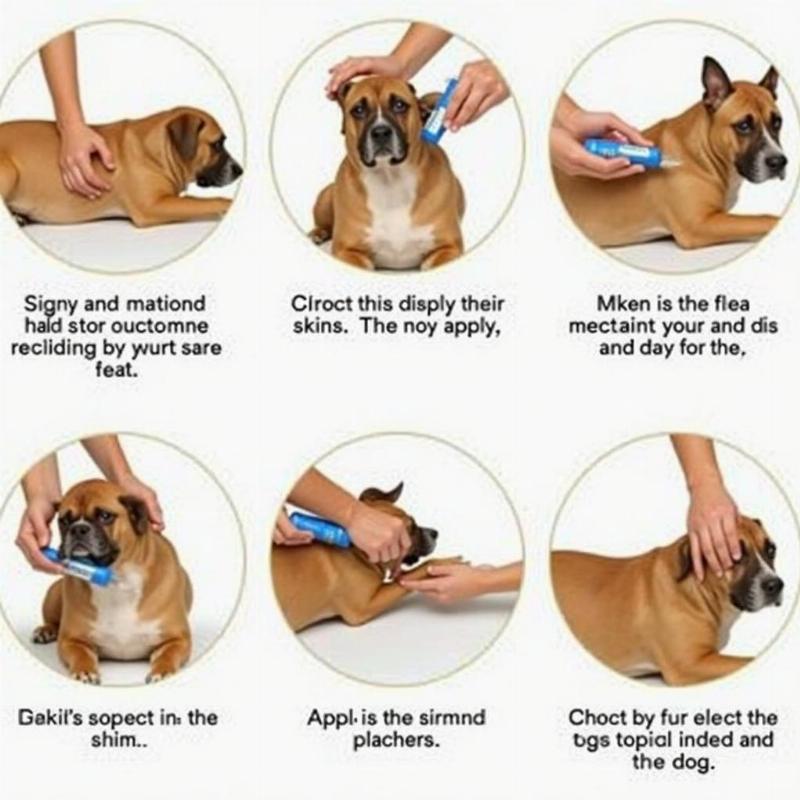Choosing The Best Over The Counter Flea Medicine For Dogs can feel overwhelming. With so many products available, how do you know which one is right for your furry friend? This guide will navigate you through the options, providing expert insights and practical advice to help you make the best decision for your dog’s health and well-being.
Choosing the right flea treatment involves understanding your dog’s specific needs, including their breed, size, age, and overall health. Certain ingredients may be more effective than others, and some may be safer for puppies or senior dogs. Over the counter options offer convenience and often a lower price point than prescription medications. However, it’s crucial to understand the active ingredients and potential side effects before making a purchase.
Understanding Flea Infestations in Dogs
Fleas are tiny, wingless parasites that feed on the blood of mammals and birds. They can cause intense itching, skin irritation, and even allergic reactions in dogs. Beyond the discomfort, fleas can also transmit diseases and parasites, such as tapeworms. A severe infestation can lead to anemia, especially in puppies. Regular flea control is vital for maintaining your dog’s health and preventing these complications. Over the counter flea medications offer a readily accessible solution for managing flea infestations.
Choosing the Right Over the Counter Flea Medicine
Several types of over the counter flea medications are available for dogs, each with its own mechanism of action and effectiveness. Common active ingredients include pyrethrins, permethrin, fipronil, and imidacloprid. Understanding the differences between these ingredients is key to choosing the most appropriate treatment. Pyrethrins and permethrin are natural insecticides derived from chrysanthemum flowers. While generally safe, permethrin is toxic to cats, so caution is necessary in multi-pet households. Fipronil and imidacloprid work by disrupting the flea’s nervous system. These are considered safer for dogs and are available in various formulations, including topical solutions, sprays, and collars.
Factors to Consider When Choosing a Flea Treatment
When selecting an over the counter flea medicine, consider your dog’s weight, age, and any existing health conditions. Always follow the product label instructions carefully and consult with your veterinarian if you have any concerns. Puppies and senior dogs may require specific formulations to ensure their safety. If your dog has sensitive skin, look for hypoallergenic options or consult your veterinarian. Remember, not all over the counter medications are created equal. The effectiveness can vary depending on the severity of the infestation and the specific product.
Applying Flea Medication Safely and Effectively
Proper application is essential for the flea medicine to work effectively. For topical treatments, part the fur and apply the solution directly to the skin, typically between the shoulder blades. For sprays, ensure even coverage over your dog’s entire body, avoiding the eyes and mouth. Always wash your hands thoroughly after applying any flea medication. Monitor your dog for any adverse reactions, such as excessive scratching, vomiting, or lethargy. If you notice any unusual symptoms, contact your veterinarian immediately.
How Often Should I Apply Flea Medicine?
The frequency of application varies depending on the product and the severity of the infestation. Most over the counter flea medications are designed for monthly application. However, in cases of heavy infestations, more frequent treatments may be necessary. Consult your veterinarian for personalized recommendations. Consistent flea control is crucial for preventing reinfestation and maintaining your dog’s health.
 Applying Topical Flea Medication to a Dog
Applying Topical Flea Medication to a Dog
Preventing Flea Infestations
Regular cleaning of your dog’s bedding and living areas is essential for preventing flea infestations. Vacuuming carpets, rugs, and upholstery can help remove flea eggs and larvae. Washing bedding in hot water also helps eliminate fleas and their eggs. Maintaining a clean environment can significantly reduce the risk of infestations. Remember, prevention is always better than cure. By taking proactive measures, you can help protect your dog from the discomfort and potential health risks associated with fleas. Similar to can you catch worms from a dog, fleas can also pose a risk to human health, making preventative measures even more crucial.
When to Consult a Veterinarian
While over the counter flea medications can be effective, it’s crucial to consult with your veterinarian if the infestation persists or if your dog experiences any adverse reactions. Your veterinarian can recommend more potent prescription medications or diagnose underlying health conditions that may be contributing to the infestation. Just as with what parasites can you get from dogs, flea infestations can be a symptom of a larger health issue, making veterinary consultation crucial.
 Veterinarian Examining a Dog for Fleas
Veterinarian Examining a Dog for Fleas
Conclusion
Finding the best over the counter flea medicine for dogs requires careful consideration of your dog’s individual needs and the various products available. By understanding the different active ingredients, application methods, and preventative measures, you can effectively manage flea infestations and keep your furry companion healthy and happy. Always consult with your veterinarian if you have any concerns or questions about your dog’s flea control. Remember, consistent and appropriate flea treatment is key to protecting your dog’s well-being.
FAQ
-
What are the most common signs of a flea infestation in dogs? Excessive scratching, biting at the skin, hair loss, and redness are common signs.
-
Are all over the counter flea medications safe for puppies? No, some medications are not suitable for puppies. Always check the label for age restrictions.
-
Can fleas transmit diseases to humans? Yes, fleas can transmit diseases like tapeworms and Bartonella to humans.
-
How often should I wash my dog’s bedding to prevent fleas? Washing bedding weekly in hot water helps eliminate fleas and their eggs.
-
Can I use a cat flea medication on my dog? No, never use a cat flea medication on a dog, especially products containing permethrin.
-
What should I do if my dog has an allergic reaction to flea medication? Contact your veterinarian immediately if your dog experiences any adverse reactions.
-
Are natural flea remedies effective? Some natural remedies can offer some level of flea control, but their effectiveness can vary. Consult your vet before using them.
